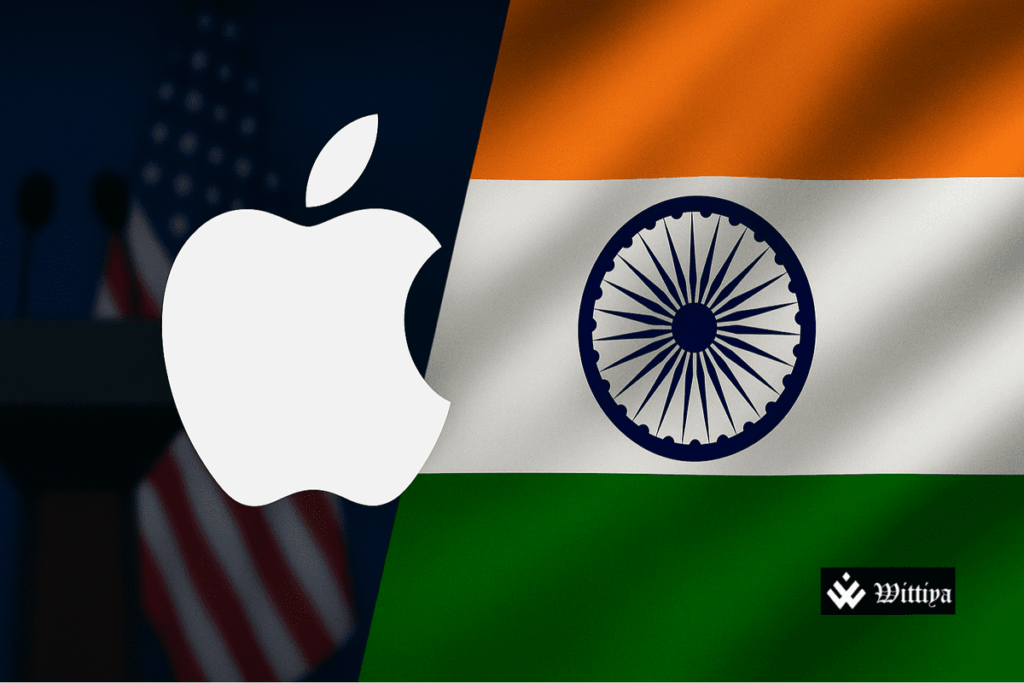Apple has reaffirmed its commitment to manufacturing in India despite former U.S. President Donald Trump’s recent appeal to halt its India operations and move production back to the U.S. Trump claimed he advised CEO Tim Cook not to build in India, but Apple and Indian officials confirmed that investment plans remain intact. Experts highlight that moving production to the U.S. is economically unfeasible. Instead, Apple is shifting operations from China to India to diversify its supply chain, boost exports, and reduce dependence on one country. India’s cost-effective ecosystem and policy support, including the PLI scheme, continue to make it a strategic hub for Apple’s global operations.
Despite strong remarks from former U.S. President Donald Trump urging Apple to halt its manufacturing expansion in India and move operations back to the United States, the tech giant appears resolute in its India strategy. Apple has reassured Indian authorities that its investment and manufacturing plans in the country remain on track and integral to its global supply chain strategy.
Trump’s Warning to Apple
Speaking at a public event, Trump said he told Apple CEO Tim Cook that the company should prioritize building in the United States instead of India. He expressed concern over Apple’s growing footprint in India, saying, “I said to him, Tim, you’re my friend… But now I hear you’re building all over India. I don’t want you building in India.”
This follows Trump’s “America First” philosophy, which prioritizes bringing jobs and manufacturing back to the U.S. However, economic realities make that ambition impractical in the context of Apple’s global operations.
Apple’s India Commitment
According to sources within the Indian government and Apple, the company remains committed to expanding its operations in India. Apple is not moving manufacturing away from the U.S. but is strategically shifting some of its production from China to India to diversify its supply chain, mitigate geopolitical risks, and reduce dependence on a single country.
India has emerged as a critical alternative to China, not only because of its growing manufacturing capabilities but also due to its favorable policies, cost advantages, and burgeoning domestic market. Apple suppliers like Foxconn, Pegatron, and Wistron have ramped up production facilities in Tamil Nadu and Karnataka, supporting local job creation and enhancing export capabilities.
Strategic Diversification
Currently, over 80% of Apple’s manufacturing takes place in China. However, geopolitical tensions, rising labor costs, and recent disruptions such as COVID-19 lockdowns have exposed vulnerabilities in relying solely on China. Apple’s pivot to India is part of a broader “China+1” strategy adopted by global manufacturers seeking resilience in their supply chains.
India, with its Production-Linked Incentive (PLI) scheme and favorable labor costs, provides a compelling alternative. Apple has already started assembling various iPhone models in India, including the iPhone 15, and the country is now one of Apple’s top global manufacturing bases.
Economic and Political Realities
While Trump’s push to relocate Apple’s manufacturing to the U.S. resonates with his political base, analysts argue that such a move is neither economically viable nor operationally efficient. Manufacturing in the U.S. would significantly raise production costs, erode Apple’s profit margins, and disrupt its finely tuned global supply chain.
Moreover, Apple’s India expansion has become a key component of its long-term strategy—not only to manufacture but also to cater to the growing Indian consumer market. With a young, tech-savvy population and increasing disposable income, India represents a significant growth frontier for Apple.
Apple’s global strategy involves maintaining flexibility and resilience in its supply chain. While political pressures from leaders like Donald Trump are noteworthy, the business case for expanding in India remains strong. India continues to offer a robust manufacturing ecosystem, government support, and access to a massive market—all essential ingredients for Apple’s long-term growth.
In the current global economic climate, Apple cannot afford to abandon its India plans. Doing so would not only limit its strategic leverage but also risk losing ground in one of the world’s most important emerging markets.



